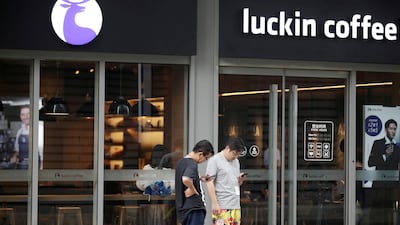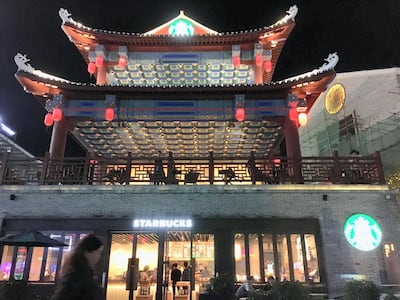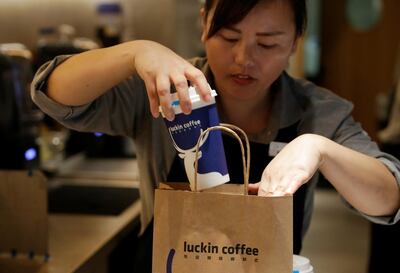Ten years ago, in the southern Chinese town of Yangshuo, you had only one choice for a western chain restaurant: KFC. These days, the riverside town, famed for its surrounding karst landscape and inundated with domestic and international tourists, offers a choice between McDonald’s, KFC, or for coffee, a Starbucks.
The Yangshuo Starbucks is a three-storey affair, housed in a traditional Chinese building with a tiled roof and elegant sloping eaves. The Starbucks mermaid logo is visible from afar, a silent siren song of caffeine.
It is one store amid 3,600 stores in more than 150 cities in China, a dizzying expansion since the Seattle company’s first store opened in Beijing 20 years ago. It is now Starbuck’s second-largest market, after the US. Its success, not just in claiming a prime retail position in China, but in transforming a country’s drinking habits is taught in business schools as a case study in patience, localisation and branding.
Coffee consumption in China - where tea has been the preferred beverage for millennia - is still growing at a rate of around 20 per cent annually, according to Coffee Business Intelligence, a market research company. While the average American or Japanese will drink around 400 cups of coffee a year, the average Chinese only drinks five cups. In terms of coffee consumption, China still has room for growth.
“I drink coffee almost every day, with sugar and milk. I got introduced to it by a friend and he told us how to drink coffee,” says Sally Shen, 52, a Beijing-based entrepreneur in English education.
“I like the smell, the spirit, and I like the way once you have a coffee mug in your hand you can spend a relaxed moment, so basically I was interested in this mood. But now I’m pretty much relying on coffee to start my day,” she says. Ms Shen, like many of her compatriots emphasises the experience of drinking coffee as part of the attraction.
Kevin Johnson, Starbuck’s chief executive, has said that China will be its biggest market within a decade as the company has plans to operate 5,000 stores in the country by 2021. Up until two years ago, its main competitor was Costa Coffee, the British brand purchased by Coca-Cola last year for £3.9 billion ($5.1 billion), which has around 450 stores in China, with plans for 1,200 by 2022.
But now Starbucks faces a new local foe: home-grown Chinese company Luckin Coffee.
Luckin was founded less than two years ago in Beijing by Qian Zhiya. Ms Qian, whose family name means “money” in Chinese, and given name Zhiya means “to rule Asia”, is one of a growing number of female tech entrepreneurs in the country. She previously worked as COO of Shenzhou, a car rental app, and her start-up chops have made Luckin a very different proposition to her American competitor.
Most Luckin stores are simple premises with a coffee machine and other supplies in the back, and the coffees are delivered to consumers who order from an app. It is Luckin’s forte: coffee-on-demand, via smartphone ordering, and delivery to wherever you may be.
Luckin is acting like a tech company, says Jeffrey Towson, a business professor at Peking University. “It is raising a lot of money very fast; it is hyper-scaling which is something tech companies do – retailers don’t really do that. It’s gone public very quickly. F&B [food and beverage] don’t go public with losses. It has dual-class shares, which is a Silicon Valley thing,” he says.
In a much-publicised initial public offering, Luckin raised more than $550 million, priced at $17 per share. On its first day of trading on Nasdaq, this increased to $25, giving the 18-month old company a market cap of over $5 billion. However, over the following days the stock price plunged by as much as 13 per cent as investors grew concerned over the company’s rapid cash burn and business model.
“It was a young and bright brand. But now it is a brand that wants to make quick money,” Liu Xiaoyu, a once-loyal Luckin customer says.
Ms Xiaoyu, 28, a personal assistant in Beijing, says she orders Luckin coffee because it’s convenient and cheap due to the frequent discount coupons on offer through the app, which she uses to order a coffee with milk delivered to her office. Like most Chinese, Ms Liu is not a daily coffee drinker and with the hype surrounding Luckin, she says she doesn’t like the “little blue cup” of Luckin as much as she used to.
From its start, Luckin prioritised convenience and price - offering speedy delivery to customers who order coffees via their phone, and bargain prices. It has over 2,370 stores over China, but unlike Starbucks many of these are small pick-up stores and not owned by the company.
But for many Chinese consumers, coffee is still more about the experience than the caffeine. “I have an emotional attachment to Starbucks,” says Gao Xiaojin, 31, a big data worker living in Shanghai. Ms Gao says she used to go to a Starbucks in her home city of Shenyang in northeast China as a high school student to study, forging a memorable connection with the American brand.
“My first choice for coffee is self-made, then second choice would be Starbucks or boutiques,” she says, adding that she uses Luckin for convenience and price only.
And although China might conjure images of traditional tea houses and steaming cups of pu’er, oolong or green tea, there is a modern way in which China is still very much a nation of tea drinkers – bubble tea.
This reporter posted on Chinese social media the question in Mandarin: “Who likes bubble tea?” The first response received was, “Who doesn’t?”
In China’s shopping malls, high streets and street corners there is a vast array of outlets offering the tapioca-embellished, highly sugary, milk-tea concoction that is now popular from Korea to California. The drink is also priced more cheaply than coffee available at Costa Coffee or Starbucks.
“Summertime, every day I drink a cup,” says Xie Jin, 30, an admin assistant in Guilin. Freya Chen, 28, who works in technology in Beijing, prefers bubble tea over coffee because she can drink it anytime and it’s “sweet and satisfying”.
For Luckin, it faces competition from Starbucks, Costa Coffee, McDonald’s, KFC, 7/11, and a host of independent coffee shops, in the category of freshly brewed coffee. But the market growth potential for this category is unprecedented.
“It’s a homerun if [Luckin] can get more coffee drinkers,” says Mr Towson. The private equity investor and professor says even if it’s an increase from the current five cups per year, for the average Chinese, to 15 cups, this represents a huge increase. “They did identify the biggest coffee opportunity on the planet and using venture capital they are after that,” he says.
“If middle-class Chinese start drinking more coffee then Luckin will do well. [But] there might be a reason still after all these years why [coffee consumption] is still so low.”
Luckin’s success will hinge on whether it can transform China into a coffee-dependent nation.



